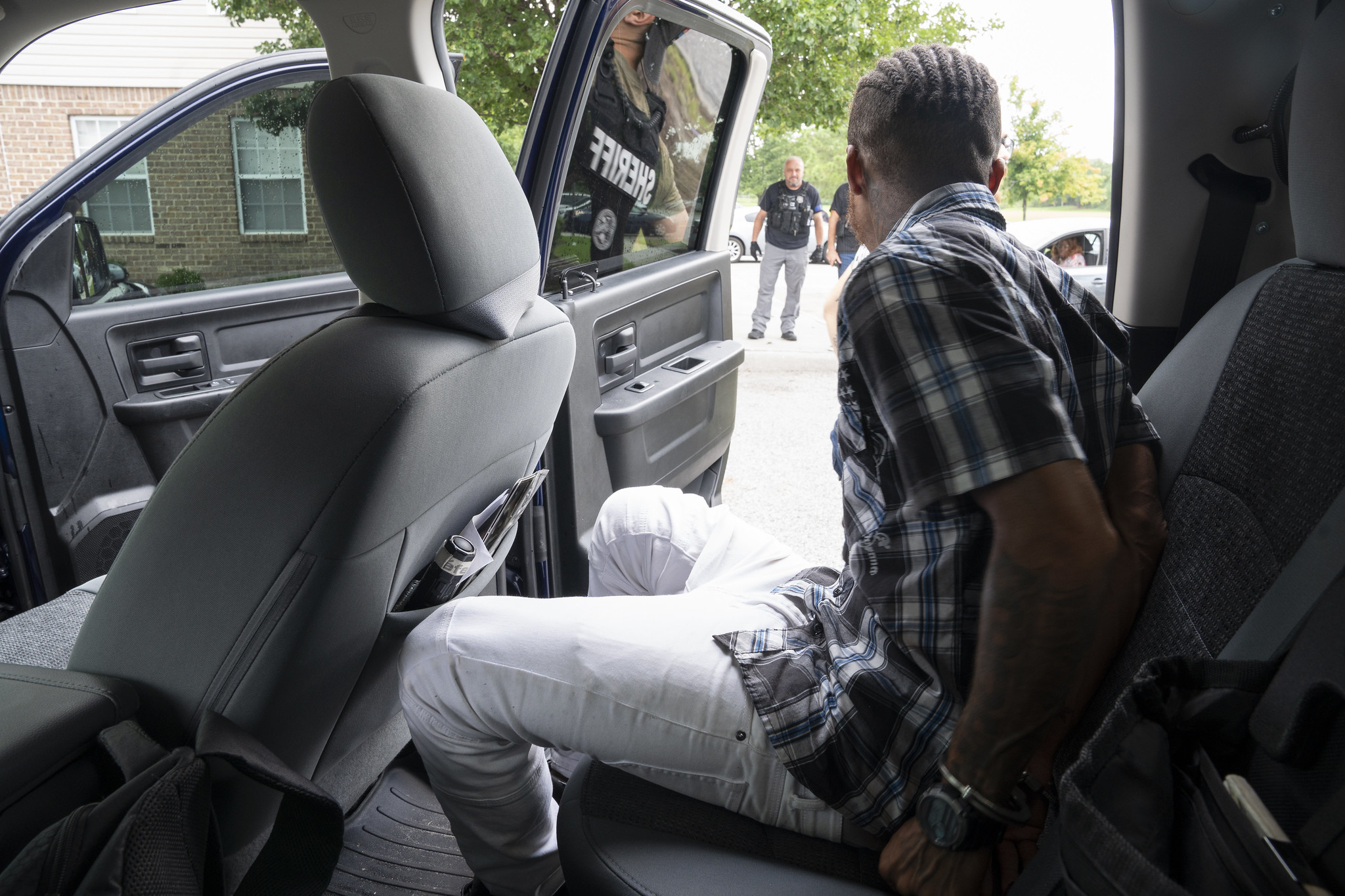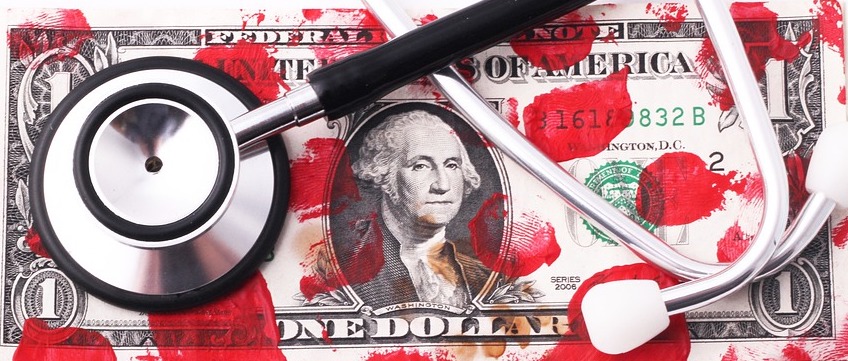A friend recently served time and the worst part of his sentence was being subjected to the country’s largest for-profit provider of prison “medical care.”

Man being arrested in Norfolk, Virginia, Aug. 8, 2019. (Office of Public Affairs, U.S. Marshals Service, Flickr)
By John Kiriakou
Special to Consortium News
 A good friend of mine did a short stint in jail recently. He got a week for contempt of court. It wasn’t a big deal. He’s a tough enough guy. But that’s not what I want to write about. I want to write about what he told me related to medical care in jail. He was in jail in Arlington County, Virginia, one of the wealthiest counties in America. He said the jail was actually quite nice. It was clean, the cells were spacious, and the deputies who served as guards couldn’t have been any more pleasant and respectful. And although the food was terrible, things could have been worse — except, that is, when it came to medical care.
A good friend of mine did a short stint in jail recently. He got a week for contempt of court. It wasn’t a big deal. He’s a tough enough guy. But that’s not what I want to write about. I want to write about what he told me related to medical care in jail. He was in jail in Arlington County, Virginia, one of the wealthiest counties in America. He said the jail was actually quite nice. It was clean, the cells were spacious, and the deputies who served as guards couldn’t have been any more pleasant and respectful. And although the food was terrible, things could have been worse — except, that is, when it came to medical care.
When my friend was first processed, he met with a nurse, who interviewed him about his current medical conditions. My friend suffers from diabetes, and he’s on three prescription drugs for it. He’s also supposed to eat a low-carb diet to prevent spikes in his blood sugar. He answered all of the nurse’s questions and was told that he would receive all of his medications after dinner that evening.
Please Contribute to Consortium News’
25th Anniversary Winter Fund Drive
But the meds never arrived. He was awakened at 4:30 a.m. every day to have his blood sugar checked, and it was checked again every afternoon at 3:30 or so. But the medication never arrived. Meanwhile, his blood sugar and blood pressure moved higher and higher. He complained every time a nurse came to check his blood sugar levels that he hadn’t received any medication and he was going through withdrawal. All that did was to cause the nurses to simply stop coming. Nobody checked his blood sugar for his last three days in jail.
Calculated Risk
There’s a business reason why the nurses threw my friend under the bus. They took a calculated risk that he wouldn’t die of a diabetes-related stroke or heart attack before being released. Imagine doing that for 1,000 patients. Or 1,000,000. If each patient’s medication costs $5 a day, that adds up to real money. And that’s the business model for Corizon Health, the country’s largest provider of for-profit “medical care” in American prisons. The company is contracted with 534 prisons and jails in 27 states, and it treats 15 percent of all the prisoners in the United States.
 According to the American Civil Liberties Union, Corizon has been sued 660 times in the past five years for wrongful death, providing substandard medical care and inadequate staffing. It has been fined untold millions of dollars. But the company sees that as the price of doing business. Again, they can make more money by just not treating people and hoping that they don’t die than they can by actually providing medical care and then paying court-ordered legal settlements.
According to the American Civil Liberties Union, Corizon has been sued 660 times in the past five years for wrongful death, providing substandard medical care and inadequate staffing. It has been fined untold millions of dollars. But the company sees that as the price of doing business. Again, they can make more money by just not treating people and hoping that they don’t die than they can by actually providing medical care and then paying court-ordered legal settlements.
Marques Davis
Take as just one example the case of Marques Davis. The 27-year-old was a prisoner in the Kansas Department of Corrections, where Corizon has an exclusive contract to provide medical care.
Davis went to a Corizon nurse saying that he felt weakness in his arms and legs. The nurse determined that Davis was “malingering,” that is, making it all up so he didn’t have to work. Months later, with the numbness worsening, Davis began to complain that he felt like something was “eating his brain.” In fact, something waseating his brain. It was an untreated fungus that caused his vision to blur, his speech to slur and his cognition to become so impaired that he began to drink his own urine.
Davis finally had a heart attack and was taken to a local Kansas City hospital. A CT scan revealed “dramatic swelling of the brain.” A day later, he was dead. Davis’ lawyer hopes to prove in court that this was not an isolated incident, but “a clear and consistent pattern of Corizon delaying, postponing, or not providing necessary medical treatment.” An ACLU spokesman said, “Corizon is simply writing off the damages they’re having to pay as the cost of doing business without doing anything meaningful to improve.”
The only way to force change and to try to stop these atrocities from happening is in the courts. So far, Corizon has shown that it simply doesn’t care what the courts say about its behavior or about the depravity of its business model.
 Arizona, however, has an idea. After scores of lawsuits against the company for failing to provide adequate care to prisoners and for failing to make any improvements in the delivery of healthcare, despite court orders to do so, Arizona simply threw Corizon out of the state.
Arizona, however, has an idea. After scores of lawsuits against the company for failing to provide adequate care to prisoners and for failing to make any improvements in the delivery of healthcare, despite court orders to do so, Arizona simply threw Corizon out of the state.
And then the state legislature passed a (nonbinding) resolution urging private equity firms based in Arizona to divest themselves of Corizon stock. Corizon leaders huffed and puffed and released statements saying that they had been wronged. They also did nothing to improve healthcare. But if 49 other states did the same thing, at least Corizon medical professionals couldn’t kill any more innocent people.
John Kiriakou is a former CIA counterterrorism officer and a former senior investigator with the Senate Foreign Relations Committee. John became the sixth whistleblower indicted by the Obama administration under the Espionage Act—a law designed to punish spies. He served 23 months in prison as a result of his attempts to oppose the Bush administration’s torture program.
The views expressed are solely those of the authors and may or may not reflect those of Consortium News.
Please Contribute to Consortium News’
25th Anniversary Winter Fund Drive
Donate securely with  Click on ‘Return to PayPal’ here.
Click on ‘Return to PayPal’ here.
Or securely by credit card or check by clicking the red button:

Once again, those with no voice don’t get heard.
The mistreatment and or lack of treatment for the incarcerated is of no consequence to governments.
As long as they seem to be doing what is required then all is well.
I mean, who ever considers how prisoners are treated, except their loved ones and in this instance, an observant journalist.
Unfortunately, callous treatment of prisoners is popular in most states, in Arizona it was actually notorious and it was a subject of a political backlash, this is perhaps the reason that the legislature paid attention to the issue. I recall that in Missouri there was an issue of rape of female prisoners, and the state legislature reacted by making it almost impossible for journalists to interview prison inmates. For these reasons, the progress exists but it is painfully slow.
I spent six years in English and Scottish prisons from 2000-2017. Health care in all British prisons was taken over by our National Health Service in the late 1990s after numerous instances of appalling neglect as in this piece. Whilst I’d never claim that my experience of medical care in prison was perfect, it was pretty close to the reasonably good standard we enjoy as a nation. I was able to have dental care and even had my ears syringed with a fancy ultrasonic device. There are plenty of improvements needed in British prisons (abolition being one of them) and there is the problem of privately-run establishments which, as in the USA, form a small minority. But the USA clearly needs medical care in prisons, as in your nation as a whole, to be taken out of the hands of private providers and made publicly owned, publicly funded, publicly run and free at the point of delivery. Nothing else, not even Medicare for All, is good enough.
Thank you for providing this further proof of the barbarous, inhuman realities of the US prison and medical system, especially its for-profit sections (by far the greater proportion).
How ANY member – so-called medical personnel – can be, themselves, so deficient in conscience is beyond belief. Well, not really. After all the same people, nurses, doctors fill US clinics, hospitals working for the corporate capitalist medical construct itself in all its forms. And they pay little or no real attention to all too many of their patients.
I couldn’t agree more. Thanks for saving me the trouble of saying that!